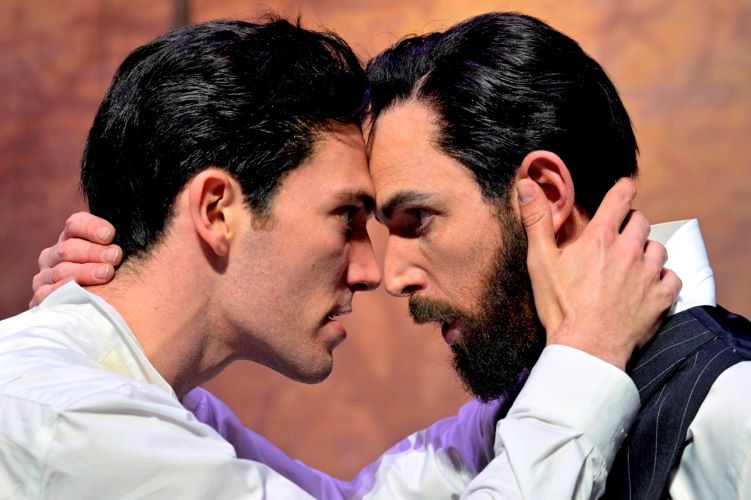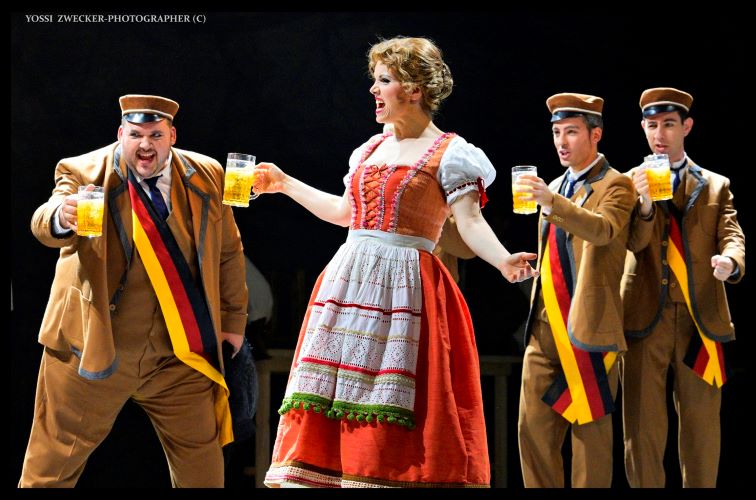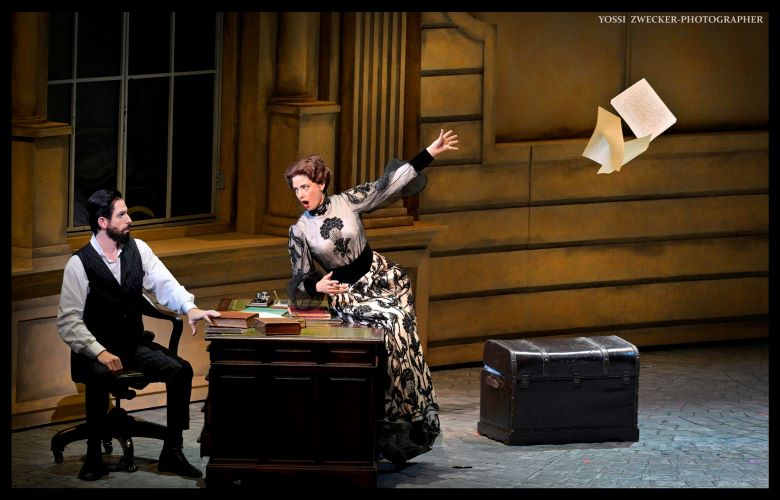
Theodor is a contemporary masterpiece, inspired by the life and work of Theodor Herzl, visionary of the State of Israel. Composed by Yonatan Cnaan and librettist and director Ido Ricklin, and conducted by Nimrod David Pfeffer, the opera merges music, drama, and brilliant artistry to create a fascinating character study. A production of the Israeli opera, Theodor premiered in May 2023, and was received with thunderous enthusiasm – the kind of wild clapping, foot-stomping, and raucous shouting usually reserved for rock concerts. The Israeli Opera, in collaboration with Ellacomm, has produced a unique, filmed version of the opera, that brings the excitement of the stage to the screen, and Theodor to a wider audience. Theodor will be screened in cinemas throughout Israel from May 9, 2024.
Telling an epic story from a very intimate perspective, the opera focuses on Theodor Herzl before he wrote The State of the Jews. Two narratives intertwine onstage: Theodor in Vienna of 1881 when he was a young law student, as portrayed by Noam Heinz, and the older Theodor, a journalist covering the Dreyfus trial in Paris in 1895, as portrayed by Oded Reich. Anticipation is in the air as the members of the orchestra rise to greet conductor Nimrod David Pfeffer. The music is stirring as the opera opens with an angry crowd pushing at the gates, crying “Death to Dreyfus” as Theodor Herzl (Oded Reich) observes, notebook in hand, fearful and tense. At home with his wife Julie (Anat Czarny) and their children, he is cold and distant, intent on his task, “not now, I’m writing.”

Lifting and lightening the mood, the scene shifts to Vienna of 1881, as young Theodor (Noam Heinz) and his friend Paul von Portheim (Shaked Strul) join Albia, a nationalistic pro-German fraternity, to the tune of a catchy drinking song. There is a joyful innocence to Heinz’s portrayal of the young Theodor, marked by a strong wish to fit in, to be accepted and respected by his peers. Anyone who has been a teenager knows that those feelings often lead to some terrible choices.
The emotional force of the opera is overwhelming, as one follows the experiences of Herzl as an individual, rather than a legend, revealed in his vulnerabilities, doubts, callousness, fears, and desires. The Herzl one encounters in the opera is a seeker, an individual struggling with his sense of identity, trying to understand the world around him and his place in the world, wanting to make his mark, and wanting to belong. Oded Reich conveys Herzl’s inner turmoil with a power and intensity that could be felt all the way to the upper balcony during the opera’s live performances. Now, in the film, the camera moves with sensitive choreography to capture the energies of live theatre, while coming in close to sense the burning intensity of Oded Reich’s gaze, the painful defiance of Julie (Anat Czarny) in the war of words between the troubled couple. The film’s visual language invites the viewer to experience the emotional landscape of the opera in greater depth, as the music enters the soul.

Anat Czarny brings a strength, intelligence, and dignity to her performance as Julie Naschauer, Herzl’s wife. Her family’s wealth supported Herzl’s pursuit of his visions, even as the marriage was unhappy, and Julie did not share Herzl’s vision for a Jewish state. History traditionally has obscured Julie’s place in Herzl’s narrative, but Cnaan and Ricklin’s opera makes a space for her, giving her a voice. Yet there is no attempt to alter her known opinions or soften her criticism of Herzl’s ideas. The characters in the opera are depicted in all their weakness and contradictions. Shaked Strul is poignant as young Theodor’s friend Paul von Portheim, so insecure and seeking external validation which time and again he fails to receive.
In its emphasis on character and feeling, there is a timeless quality to the opera, its moment in history resonating with contemporary audiences. When, in the first scenes, the older Herzl (Reich) calls on the audience to watch the streets instead of coming to the opera, I felt his words awaken my own inner thoughts and conflicts. Seeing and hearing Herzl’s vision brought to life onstage, heightens the awareness of the current reality and events. As Oded Reich sang: “Every man will be as free and undisturbed in his faith or his disbelief as he is in his nationality. And if it should occur that men of other creeds and different nationalities come to live amongst us, we should accord them honorable protection and equality before the law,”* the quote from Herzl’s The State of the Jews elicited spontaneous applause from the audience, and the excitement of those moments is palpable in the film. Theodor is a timely reminder of the vision, a work of music and theatre of astonishing beauty, exhilarating and inspiring.
Theodor opens in cinemas May 9, 2024.
*Quote from Goodreads





